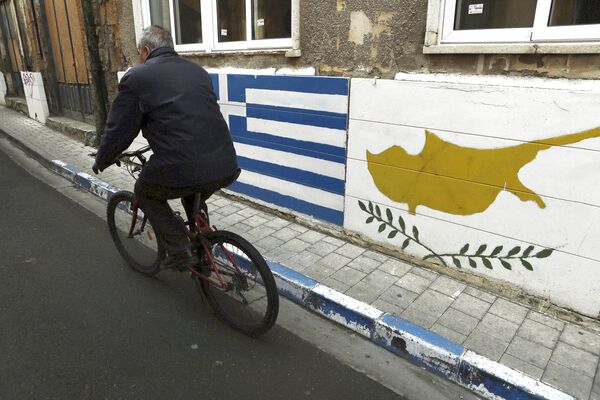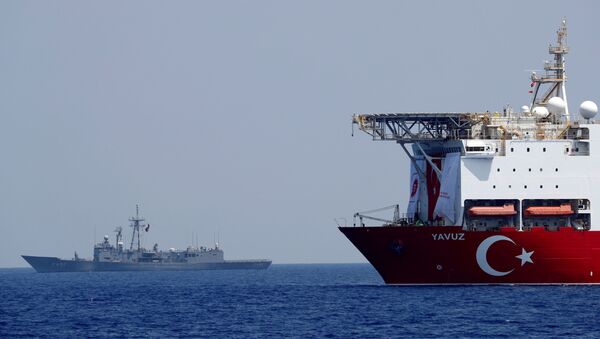On 12 September, US Secretary of State Mike Pompeo inked a memorandum of understanding (MoU) with the Greek Cypriot administration which envisages the creation of a regional border security training hub – the Cyprus Centre for Land, Open Seas and Port Security (CYCLOPS) in Larnaca.
The Turkish government slammed the MoU, stressing that the memo ignores a de facto state in the north-eastern portion of the island – the self-declared Turkish Republic of Northern Cyprus (TRNC). "The memorandum of understanding will not serve peace and stability in the eastern Mediterranean and will damage the solution of the Cyprus problem," Turkey’s Foreign Ministry stated on Monday.
'US is Mistaking Turkey for a Child'
During his trip to Cyprus, Pompeo touched upon the escalation of tensions in the eastern Mediterranean, urging Turkey to resolve the stand-off through diplomatic means.
"The United States is deeply concerned about Turkey’s actions in the eastern Mediterranean", Pompeo remarked on Saturday. "Countries in the region need to resolve disagreements including on security and energy resource and maritime issues diplomatically and peacefully. Increased military tensions help no one except adversaries who would like to see division in transatlantic unity".
Washington's calls for a peaceful solution of the row over the Mediterranean region does not correlate with its decision to throw its weight behind Nicosia, notes Professor Celalettin Yavuz, an advisor to the chairman of the Turkish Nationalist Movement Party (MHP) and a retired captain of the Turkish Navy.
"One gets the feeling that the United States is mistaking Turkey for a small child that can be easily fooled", Yavuz points out. "On the one hand, it supplies the Greek Cypriots with weapons, lifts the embargo and literally pushes them towards militarization, and on the other hand, it declares the need to establish a dialogue and kicks off peaceful diplomatic initiatives in the region.”
The United States’ actions, tone and duplicity on this issue are unacceptable for Turkey, Yavuz stresses, adding that "it is Turkey who always strives to use diplomatic methods".

What's Behind US Creating a New Security Centre in Cyprus?
According to the White House announcement, the new security hub will allow the United States and its partners "to provide technical assistance in more areas related to security and safety, including customs and exports control, port and maritime security, and cybersecurity".
"CYCLOPS will support our efforts to curb the proliferation risks posed by malign regional actors and violent extremist organisations", the US government statement says.
The Yavuz pointed out that after the attacks of 11 September 2001, the United States took a number of anti-terrorist measures at the UN and NATO level to ensure the safety of sea routes, ports, and air transportation. Thus, the US and NATO launched Operation Active Endeavour in the Mediterranean to monitor shipping to help deter and disrupt terrorist activity and to defend against it.
"These measures say that cargo ships approaching the US borders have to provide information to ports at certain frequencies", he elaborates. "Then, based on this data, they are either allowed to enter the port or not. Similarly, at the US initiative within NATO, the Active Endeavour group was created in the Eastern Mediterranean, consisting of ships. From time to time, NATO states, including Turkey, send their ships there. Thus, it is monitored whether there are terrorists among the suspicious persons on the ships that left the Suez Canal, or whether weapons, ammunition, etc. are smuggled for terrorist purposes".
However, the situation surrounding the creation of a security centre in the Greek part of Cyprus is fundamentally different, Yavuz emphasises, adding that the facility amounts to nothing short of a military base.
"I believe that this step has nothing to do with anti-terrorist measures, and cannot be explained by the implementation of the strategy to combat terrorism", he concludes.
Earlier this month, the US State Department signalled that it would lift the ban on non-lethal defence articles and services to Cyprus for the coming fiscal year.
I welcome the lifting of the #US arms embargo on non-lethal defense articles. A positive development which reinforces further the bilateral security relationship between #Cyprus and the #UnitedStates.
— Nicos Anastasiades (@AnastasiadesCY) September 1, 2020
The bill ending the arms embargo on Cyprus was passed by the US Congress in December 2019. Responding to the move, the Turkish Foreign Ministry highlighted that "this step does not comply with the spirit of the alliance" between Ankara and Washington.
On 11 September, The Washington Examiner quoted US lawmakers and analysts as saying that Washington had grown weary of Turkish President Recep Tayyip Erdogan’s threats to close the Incirlik Air Force base and some of them now view Cyprus and Greece as an alternative to the Turkish base.
"We don’t know what’s going to happen to Incirlik,” US congressman Ron Johnson, who chairs the Senate Foreign Relations subcommittee for Europe, said. "We hope for the best, but we have to plan for the worst".




